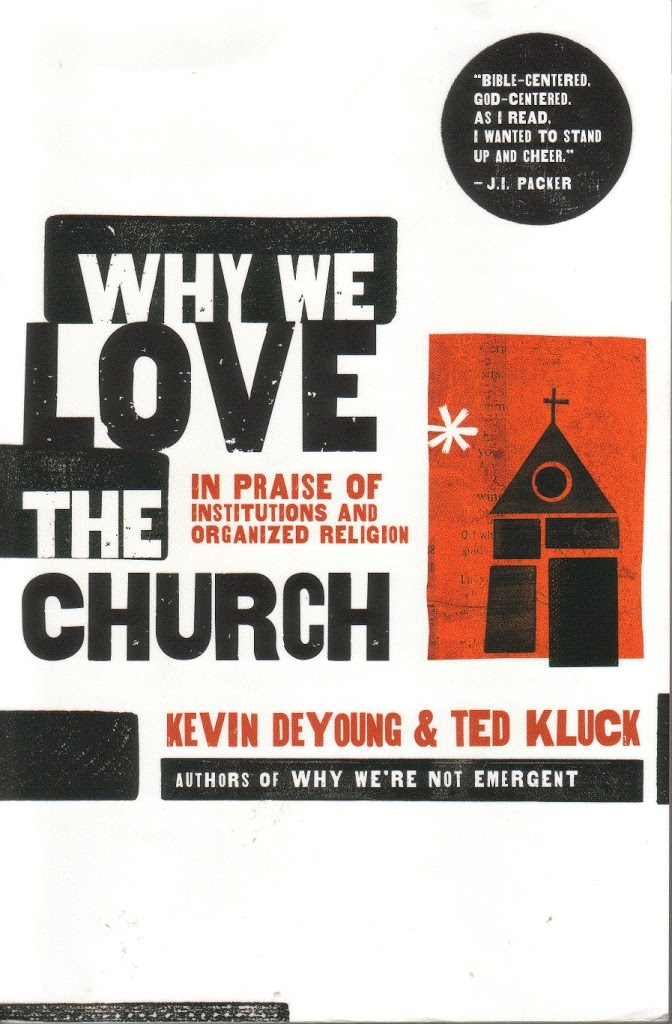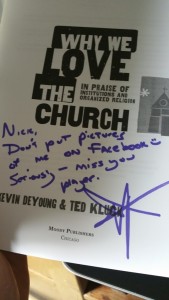
Synopsis
Overall Rating
Final Thoughts
Year Published
2009
Authors
Topics
Synopsis
Final Thoughts
Overall Rating
the good
I appreciate what Kluck and DeYoung were trying to do. They have a heart for the church and don’t want people to just leave it. I agree that the church can be good. I also agree that there needs to be some structure within a church. I also cannot deny that this book is well written. It’s easy to read and flows well. It’s not too heady or too fluffy. DeYoung and Kluck strike a great balance of intellect and accessibility.
Of course, Kluck and DeYoung don’t think any church is perfect. They admit that event hey have problems with their own church at times. (They’re “authentic”.) But they value and love it nonetheless, which is admirable.
the bad
There are quite a few problems I had with their defense of the traditional church. One was their appeal to the church being seen as negative even in ancient times. Yes, it’s true that the early church was thought to be atheists, incestuous, and full of orgies. However, the problem arises when they compare this to the view of the church today as anti-gay, hypocritical, and full of hate. What’s the difference? The accusations against the church today are actually legitimate.There’s something to be said for the ancient church having rumors spread about them. They were persecuted and looked down on for things they weren’t doing. That’s not cool. But it’s far from the church today being judged for the bad things they are doing. The fact that the church isn’t attractive to outsiders is a common thing, yes. But, when the fact that it’s not attractive because the church is making itself unattractive, rather than people just not understanding it, that’s a major problem within the church.
They also argued that the traditional church has been a staple throughout history. This in itself is true. However, there are other models of Christianity throughout history as well. Including the less traditional and structured house-churches. If you want to appeal to history, at least acknowledge that your part of history isn’t the only part.
I want to mention their response to the crusades without going into much detail because I don’t think it’s that important to the book or this brief, but it is something that I disliked about the book.
There’s a common thread within this book and many other Christian books. I like to call it the gospel of fear. Somewhere along the way, Christianity was invaded by Gnosticism in terms of what’s important. Somehow we see heaven and hell as the most important things. There are many places in this book when they discuss the church as a place to help people go to heaven and not hell. And that’s good, to an extent. But when we start to preach a gospel of fear rather than a gospel of love, and the gospel that God created the world and loves everyone and wanted everyone to be in community with him, we’re not only doing a disservice to those whom we’re ministering to, but we’re watering down the story of God to just- you either go to heaven or hell and you should be scared of hell. Fear should never be a motivation, especially not one Christians put onto someone.
Lastly, I feel like the authors forgot that times change. The church presented in the scriptures was the church that was needed for the time. The people responded to that church in the best way because of their culture. We’re 2,000 years later and so much has changed. People clearly aren’t responding to church the same way because we’re different people in a different time. We need to adjust our idea and model of church to fit what people need, not just what we’ve always done.
Let me explain briefly. Back in the day education was expensive (it still is), but today it’s more easily accessible. In Biblical times to took a lot to learn. So there were only some people who were able to teach and preach. Now we have so many Christian theologians, authors, bloggers, etc. floating around that it’s a lot easier to learn from others. We can all do our own research to While the church used to be necessary for teaching Christianity, it’s simply not anymore with the advancement of education and technology.
final thoughts
 Funny story- I have a signed copy of this book that I won in a Facebook contest where Kluck called me out for posting picture of him on Facebook while he was professing a speech class. I also had to read this book for one of my undergrad classes.
Funny story- I have a signed copy of this book that I won in a Facebook contest where Kluck called me out for posting picture of him on Facebook while he was professing a speech class. I also had to read this book for one of my undergrad classes.
I do enjoy the book. And I do think church is important. I don’t, however, think church has to be done in a specific church building. Church can happen at a coffee shop; or at a golf course; or even within a Facebook group. The traditional church worked for a while, and it still works in some regards today. But there are many problems with it- legitimate problems- that need to be addressed and fixed. It’s also not the best way to minister to people today, which is something I simply can’t ignore.




